Confessions of a christmas addict
I have a confession to make. I love Christmas and start the season as early as possible every year. My Christmas tree is up, the stockings are hung, the advent calendar is set up waiting patiently for the 1st of December to roll around, and I’ve very nearly finished my Christmas shopping.
The debate surrounding the early celebration of Christmas remains a topic of contention every year. While some eagerly adorn their homes with twinkling lights and festive decor as soon as November arrives, others frown upon the premature celebration. This creates a challenge for marketers of seasonal brands, who have the impossible task of catering to early adopters, whilst also not inducing stress and/or disgust to late starters.
The drivers behind early adopters
The inclination to immerse in the Christmas spirit early is underpinned by a rich array of emotional and psychological motivations. These include:
- Nostalgia as a key driver: The allure of early Christmas celebrations often hinges on nostalgia, the sentimental longing for the past. Nostalgia serves as a powerful emotional anchor, invoking cherished memories from childhood or past celebrations. Revisiting these memories can evoke a deep sense of comfort, security, and emotional well-being. The rekindling of traditions provides a sense of continuity and connection to one’s personal history.
- Sense of Belonging and Community: Regardless of one’s religious affiliation, Christmas as a communal celebration fosters a strong sense of belonging and togetherness. Engaging in festive activities early on can signal one’s affiliation with a larger community that shares the same values and traditions. It’s an opportunity to participate in a collective experience, reinforcing social bonds and a feeling of unity with family, friends, and society at large. In a world that often feels fragmented, these shared traditions can act as unifying threads, offering a sense of shared experience and belonging.
- Comfort in the familiar: Familiarity and routine provide psychological comfort, especially in times of uncertainty. The predictability of annual traditions and rituals associated with Christmas—decorating, giving and receiving gifts, special meals—creates a sense of structure and order. This predictability can serve as a coping mechanism, offering a degree of control and stability in an otherwise unpredictable world.
For many, the early start to the Christmas season isn’t solely about the holiday itself but about the emotional and psychological benefits it brings. It’s a deliberate choice to immerse oneself in the familiarity, warmth, and security that the season represents.
The burden of expectations
Those who become stressed by the early onset of Christmas often cite the pressures associated with the season. In a recent study, it was revealed that one 1 in 10 people anticipate the Christmas season with dread. Some of the reasons for this include:
- Social Expectations and Pressures: The social demands linked to the Christmas season can impose a considerable weight on people. There’s a perceived need to craft an ideal holiday, entailing multiple social commitments, from hosting events to securing perfect gifts. For some people, this is simply exhausting.
- Financial Strain: The Christmas season often brings financial pressures. In our current post pandemic economy, where cost of living is ever increasing, this feeling is exacerbated. A recent survey showed that 31% of Australian adults are feeling more stressed about Christmas since the Covid-19 pandemic, with 34% of respondents planning on spending less over Christmas than previous years.
- Unrealistic Expectations and Comparison: The prevalence of social media showcasing seemingly perfect holiday experiences can create unrealistic expectations. Comparing one’s own celebrations to the seemingly flawless ones depicted online can lead to feelings of inadequacy and stress. Psychologist and Associate Professor Jennifer Mills explains this further; “Social media now means that we can make infinite comparisons between our lives and what’s happening in other people’s lives,” says Mills. “Generally people only post the good or exciting stuff on social media, so we don’t have a realistic comparison showing others doing mundane things or, even more realistically, feeling upset or lonely over the holidays. Photos are usually carefully curated to show people’s lives at their best. We don’t get to see the disagreements, messes, and credit card statements that would show the reality of most people’s lives this time of year.”
The challenge for Marketers
Determining the timing for Christmas communications is a strategic challenge for marketers, who must strike a delicate balance of aiming to maximise impact during the festive season without alienating those who commence their planning later in the season. When is the right time to start seeding Christmas messages in the market? Consumer behaviour shows that:
- Searching for Christmas deals starts before Halloween: In 2022, Australian’s search interest for the term ‘Christmas Deals’ peaks on the 27th of October, indicating that Halloween is a key trigger for consumers to start planning for the Christmas period.

- November sales continue to grow year on year: In 2022, the Australian Retail Association noted a 5% growth in sales during the November period compared to the corresponding period the previous year, and an impressive 25.6% surge when compared to November 2019.
- Black Friday encourages early Christmas spending: The phenonium of Black Friday shopping continues to grow in Australia and is encouraging Australian’s to start their Christmas shopping early. The Australian Retail Association reports that around a quarter (25%) of Christmas shopping is completed in Black Friday week alone with a third (33%) already completed in the first three weeks of November.
Early Christmas communications offers a twofold advantage for brands. Firstly, it captures the attention of festive enthusiasts who eagerly anticipate the season, fostering a connection with proactive shoppers. Simultaneously, it subtly builds awareness among those who typically delay Christmas preparations. By consistently exposing the audience to festive promotions, brands create associations that resonate when the Christmas spirit kicks in for consumers, whether that be early or later in the season.
Now if you’ll excuse me, I need to get back to playing “All I want for Christmas is you” on repeat.




